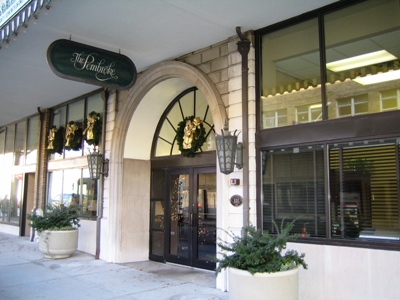Journal Entries

July, 2003, page 1
The rainy seasons have returned, the long years of Tennessee's drought or near-drought over. This Spring has brought heavy rains all over the Southeast, ruining farmers' crops and flooding many small communities. My husband remembers his undergrad days at UT in the 60s and how he was never without an umbrella, that it rained relentlessly during his five years here. A botany minor, he said that botanists traveled here from all over the world to study the broadly diverse vegetation, that this East Tennessee Valley was commonly referred to as a rainforest. All that dense vegetation means high levels of pollen and mold and also a high percentage of allergy sufferers.
The rain tapered off in the 70s, and the 80s and 90s were relatively dry. This evening, taking my daily walk with an umbrella, I was reminded again why the melancholy poetry of the T'ang Dynasty resonates, the descriptions of misty mountains and rushing streams so familiar. When Wang Wei says, "...in those hills half is all rain/Streaming off branches to multiply the springs," I imagine he was having a spring and summer like this one.
I don't know about the rainforest, but find it fascinating that we share the same temperate zone as parts of northern China. In fact, the Smithsonian website claims the two richest temperate forests in the world, in terms of plant species, are the Hunan-Setzuan forests of China and the Appalachian-Blue Ridge forest of North America. I imagine walking the ridges of Wang-Wei's mountain home would bring a sense of deja vu.
Below the Clinch Ave bridge, the Waters of the World looked almost high enough to bath in, and the newly laid grass behind the amphitheater was greening up like a golf course. The young pines along the walkway have sent out spiky bursts of new growth, and the faux river crashing over the faux dam and rock-strewn riverbed below the convention center sounded almost real. Someone had pulled the blue vinyl tarp from off the newly bronzed Rachmaninoff statue, and water was dripping from his chin and nose as if he had just finshed a performance of the Rach 3, the long and arduous piano concerto which was the centerpiece of the film Shine.
First Creek below The Hill was high and muddy and seemed just about fast enough to sluice an innertube on down to the river. On the creekside sidewalk which winds up the left side of The Hill, a mud turtle, wet and muddy was inching along. I tried to explain to him that a sidewalk is not a safe place for a turtle, that he was in danger of being squashed by a runner or bicyclist, but he rebuffed my offer of a lift to the bank, bucking forcibly enough to let me know he meant to stay his course. Across the street, a duck stood watching. Did they know each other, do different species converse? Maybe. And who was I to second-guess a turtle, the symbol of long life to the Chinese even into the new millennium. Probably he had crawled up out of the torrent to keep from drowning or from being dashed against the rocks. At least there'll be little traffic along his route tonite; maybe he'll reach his destination. Wang-Wei, the great Buddhist poet, no doubt would have considered him a good omen. I once read that Wang-Wei carved a dove on the handle of his walking stick and put a turtle shell under his bed. He would be at home here, I think, with all our gingkos and metasequoias, our dogwoods and bamboo, buying his Sen-Cha at the Asian supermarket on Sutherland Avenue and sipping egg-drop soup at the China Noodle in Western Plaza. He might even find spots quiet enough in our deserted weekend village to sit zazen.
| 
 Union Avenue
Union Avenue